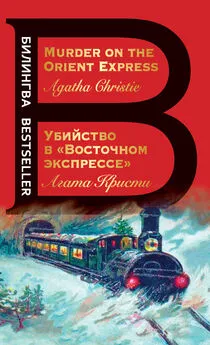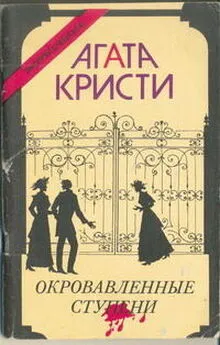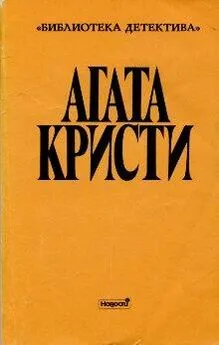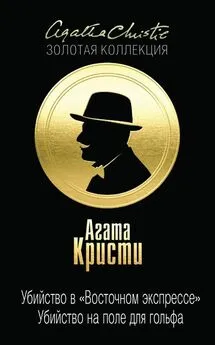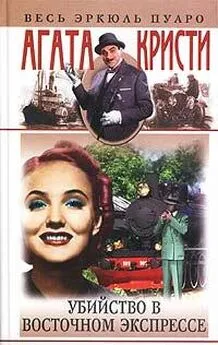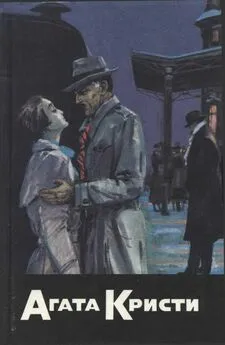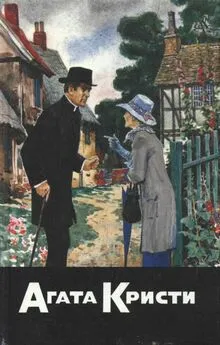Агата Кристи - Убийство в «Восточном экспрессе» / Murder on the Orient Express
- Название:Убийство в «Восточном экспрессе» / Murder on the Orient Express
- Автор:
- Жанр:
- Издательство:Литагент 1 редакция (7)
- Год:1934
- ISBN:978-5-04-114084-7
- Рейтинг:
- Избранное:Добавить в избранное
-
Отзывы:
-
Ваша оценка:
Агата Кристи - Убийство в «Восточном экспрессе» / Murder on the Orient Express краткое содержание
Убийство в «Восточном экспрессе» / Murder on the Orient Express - читать онлайн бесплатно ознакомительный отрывок
Интервал:
Закладка:
“At any rate, Madame, you are quite happy and contented now?”
“Well, no, I wouldn’t say that. Here we are stuck in a snowdrift and nobody doing anything about it, and my boat sailing the day after to-morrow.”
“Madame,” said M. Bouc, “we are all in the same case – every one of us.”
“Well, that’s true,” admitted Mrs. Hubbard. “But nobody else has had a murderer walking right through her compartment in the middle of the night.
“What still puzzles me, Madame,” said Poirot, “is how the man got into your compartment if the communicating door was bolted as you say. You are sure that it was bolted?”
“Why, the Swedish lady tried it before my eyes.”
“Let us just reconstruct that little scene. You were lying in your bunk – so – and you could not see for yourself, you say?”
“No, because of the sponge-bag. Oh! my, I shall have to get a new sponge-bag. It makes me feel sick at my stomach to look at this one.”
Poirot picked up the sponge-bag and hung it on the handle of the communicating door into the next carriage.
“Précisément. I see,” he said. “The bolt is just underneath the handle – the sponge-bag masks it. You could not see from where you were lying whether the bolt was turned or not.”
“Why, that’s just what I’ve been telling you!”
“And the Swedish lady, Miss Ohlsson, stood so, between you and the door. She tried it and told you it was bolted.”
“That’s so.”
“All the same, Madame, she may have made an error. You see what I mean.” Poirot seemed anxious to explain. “The bolt is just a projection of metal – so. When it is turned to the right, the door is locked. When it is left straight, the door is unlocked. Possibly she merely tried the door, and as it was locked on the other side she may have assumed that it was locked on your side.”
“Well, I guess that would be rather stupid of her.”
“Madame, the most kind, the most amiable, are not always the cleverest.”
“That’s so, of course.”
“By the way, Madame, did you travel out to Smyrna this way?”
“No. I sailed right to Stamboul, and a friend of my daughter’s, Mr. Johnson (a perfectly lovely man, I’d like to have you know him), met me and showed me all round Stamboul. But it was a very disappointing city – all tumbling down; and as for those mosques, and putting on those great shuffling things over your shoes – where was I?”
“You were saying that Mr. Johnson met you.”
“That’s so, and he saw me on board a French Messageries boat for Smyrna, and my daughter’s husband was waiting right on the quay. What he’ll say when he hears about all this! My daughter said this would be just the safest, easiest way imaginable. ‘You just sit in your carriage,’ she said, ‘and you land right in Parrus, and there the American Express will meet you.’ And, oh, dear, what am I to do about cancelling my steamship passage? I ought to let them know. I can’t possibly make it now. This is just too terrible—”
Mrs. Hubbard showed signs of tears once more.
Poirot, who had been fidgeting slightly, seized his opportunity.
“You have had a shock, Madame. The restaurant attendant shall be instructed to bring you along some tea and some biscuits.”
“I don’t know that I’m so set on tea,” said Mrs. Hubbard tearfully. “That’s more an English habit.”
“Coffee, then, Madame. You need some stimulant —”
“That cognac’s made my head feel mighty funny. I think I would like some coffee.”
“Excellent. You must revive your forces.”
“My, what a funny expression!”
“But first, Madame, a little matter of routine. You permit that I make a search of your baggage!”
“What for?”
“We are about to commence a search of all the passengers’ luggage. I do not want to remind you of an unpleasant experience, but your sponge-bag – remember.”
“Mercy! Perhaps you’d better! I just couldn’t bear to get any more surprises of that kind.”
The examination was quickly over. Mrs. Hubbard was travelling with the minimum of luggage – a hat-box, a cheap suitcase, and a well-burdened travelling bag. The contents of all three were simple and straightforward, and the examination would not have taken more than a couple of minutes had not Mrs. Hubbard delayed matters by insisting on due attention being paid to photographs of “my daughter” and of two rather ugly children—“my daughter’s children. Aren’t they cunning?”
Chapter 15
The Evidence Of The Passengers’ Luggage
Having delivered himself of various polite insincerities, and having told Mrs. Hubbard that he would order coffee to be brought to her, Poirot was able to take his leave accompanied by his two friends.
“Well, we have made a start and drawn, a blank,” observed M. Bouc. “Whom shall we attack next?”
“It would be simplest, I think, just to proceed along the train, carriage by carriage. That means that we start with No. 16—the amiable Mr. Hardman.”
Mr. Hardman, who was smoking a cigar, welcomed them affably.
“Come right in, gentlemen. That is, if it’s humanly possible. It’s just a mite cramped in here for a party.”
M. Bouc explained the object of their visit, and the big detective nodded comprehendingly.
“That’s O. K. To tell the truth I’ve been wondering you didn’t get down to it sooner. Here are my keys, gentlemen, and if you like to search my pockets too, why, you’re welcome. Shall I reach the grips down for you?”
“The conductor will do that. Michel!”
The contents of Mr. Hardman’s two “grips” were soon examined and passed. They contained, perhaps, an undue proportion of spirituous liquor. Mr. Hardman winked.
“It’s not often they search your grips at the frontiers – not if you fix the conductor. I handed out a wad of Turkish notes right away, and there’s been no trouble so far.”
“And at Paris?”
Mr. Hardman winked again.
“By the time I get to Paris,” he said, “what’s left over of this little lot will go into a bottle labelled hairwash.”
“You are not a believer in Prohibition, Monsieur Hardman,” said M. Bouc with a smile.
“Well,” said Hardman, “I can’t say Prohibition has ever worried me any.”
“Ah!” said M. Bouc. “The speakeasy.” He pronounced the word with care, savouring it. “Your American terms are so quaint, so expressive,” he said.
“Me, I would much like to go to America,” said Poirot.
“You’d learn a few go-ahead methods over there,” said Hardman. “Europe needs waking up. She’s half asleep.”
“It is true that America is the country of progress,” agreed Poirot. “There is much that I admire about Americans. Only – I am perhaps old-fashioned – but me, I find the American women less charming than my own countrywomen. The French or the Belgian girl, coquettish, charming – I think there is no one to touch her.”
Hardman turned away to peer out at the snow for a minute.
“Perhaps you’re right, M. Poirot,” he said. “But I guess every nation likes its own girls best.” He blinked as though the snow hurt his eyes.
“Kind of dazzling, isn’t it?” he remarked. “Say, gentlemen, this business is getting on my nerves. Murder and the snow and all. And nothing doing. Just hanging about and killing time. I’d like to get busy after someone or something.”
“The true Western spirit of hustle,” said Poirot with a smile.
The conductor replaced the bags and they moved on to the next compartment. Colonel Arbuthnot was sitting in a corner smoking a pipe and reading a magazine.
Poirot explained their errand. The Colonel made no demur. He had two heavy leather suitcases.
“The rest of my kit has gone by long sea,” he explained.
Like most Army men the Colonel was a neat packer. The examination of his baggage took only a few minutes. Poirot noted a packet of pipe-cleaners.
“You always use the same kind?” he asked.
“Usually. If I can get ’em.”
“Ah!” Poirot nodded.
These pipe-cleaners corresponded exactly with the one he had found on the floor of the dead man’s compartment.
Dr. Constantine remarked as much when they were out in the corridor again.
“Tout de même,” murmured Poirot, “I can hardly believe it. It is not dans son caractère, and when you have said that, you have said everything.”
The door of the next compartment was closed. It was that occupied by Princess Dragomiroff. They knocked on the door and the Princess’s deep voice called “Entrez!”
M. Bouc was spokesman. He was very deferential and polite as he explained their errand.
The Princess listened to him in silence, her small toad-like face quite impassive.
“If it is necessary, Messieurs,” she said quietly when he had finished, “that is all there is to it. My maid has the keys. She will attend to it with you.”
“Does your maid always carry your keys, Madame?” asked Poirot.
“Certainly, Monsieur.”
“And if, during the night at one of the frontiers, the customs officials should require a piece of luggage to be opened?”
The old lady shrugged her shoulders.
“It is very unlikely. But in such a case, the conductor would fetch her.”
“You trust her, then, implicitly, Madame?”
“I have told you so already,” said the Princess quietly. “I do not employ people whom I do not trust.”
“Yes,” said Poirot thoughtfully. “Trust is indeed something in these days. It is perhaps better to have a homely woman whom one can trust than a more chic maid – for example, some smart Parisienne.”
He saw the dark intelligent eyes come slowly round and fasten themselves upon his face.
“What exactly are you implying, M. Poirot?”
“Nothing, Madame. I? Nothing.”
“But yes. You think, do you not, that I should have a smart Frenchwoman to attend to my toilet?”
“It would be perhaps more usual, Madame.”
She shook her head.
“Schmidt is devoted to me.” Her voice dwelt lingeringly on the words. “Devotion – c’est impayable.”
The German woman had arrived with the keys. The Princess spoke to her in her own language, telling her to open the valises and help the gentlemen in their search. She herself remained in the corridor looking out at the snow, and Poirot remained with her, leaving M. Bouc to the task of searching the luggage.
She regarded him with a grim smile.
“Well, Monsieur, do you not wish to see what my valises contain?”
He shook his head.
“Madame, it is a formality, that is all.”
“Are you so sure?”
“In your case, yes.”
“And yet I knew and loved Sonia Armstrong. What do you think, then? That I would not soil my hands with killing such canaille as that man Cassetti? Well, perhaps you are right.”
She was silent a minute or two. Then she said:
“With such a man as that, do you know what I should have liked to do? I should have liked to call to my servants: ‘Flog this man to death and fling him out on the rubbish heap!’ That is the way things were done when I was young, Monsieur.”
Still he did not speak, just listened attentively.
She looked at him with a sudden impetuosity.
“You do not say anything, M. Poirot. What is it that you are thinking, I wonder?”
He looked at her with a very direct glance.
“I think, Madame, that your strength is in your will – not in your arm.”
She glanced down at her thin, black-clad arms ending in those claw-like yellow hands with the rings on the fingers.
Читать дальшеИнтервал:
Закладка:
